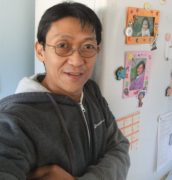Danica Mae and other poems
The President’s helicopter will never land
near your barangay. He will never walk
up to your mother’s house, dust his shoes
off before stepping through the door.
He’ll never look around where you kept
your toys. His eyes won’t linger on your clothes
as they hang or lay folded, now separate
from the family laundry. He won’t ask
what your favorite ice cream
flavor was, or how you held a crayon
in your hand, or whether you covered
your mouth whenever you laughed.
Whatever I say won’t matter,
not to you. Not even as I declare that bullets
did not end your life, words did.
The bullets were nothing but bits
of metal that could have been
a door to your toy car,
or the buttons of a dress
you will never now wear.
Standing in Tagaytay
He crumples
his plastic cup
in his fist, this boy
with a toy gun.
Then he hurls the cup.
Like his father, he laughs
as it misses
the garbage bin.
They move to the woman
who has just dropped
a coin into the telescope.
“Ma, it’s my turn!”
The woman does not budge.
The boy gives a nudge
at his mother’s elbow
and, with his gun,
hits the metal body
of the telescope. It echoes
like a wailing baby.
As the woman surrenders her place
the man lifts the boy.
Happy, he clings to the cold
metal and takes a peek
at the stillness of the volcano
and the lake
that seem only a picture
misted in time.
For a moment
the woman watches her family
before turning back
to the vast world embracing
all who are there.
She stares into the distance
at the only boat moving,
moving as if forever
without reaching shore.
Tagaytay is a popular destination for Manila’s population because of its proximity and elevation. It offers a magnificent view of Taal Volcano which is surrounded by a lake; but inside the volcano is another lake which surrounds the center of the collapsed volcano—an eye-within-an eye if seen from the heavens.
The Long and Brief History of the Bald Old Man and the Busted Pot
coal darkens then goes
red at the fervent groans
and gripes of this man, all
skin and bones, boiling rice
![]()
Danica Mae
Hindi kailanman lalapag malapit sa iyong barangay
ang helikopter ng Presidente. Hindi siya kailanman
maglalakad patungo sa bahay ng iyong ina, o magpapagpag
ng alikabok sa sapatos bago humakbang papasok ng pinto.
Hindi kailanman hahagurin ng kanyang tingin kung saan mo
dating itinatabi ang iyong mga laruan. Hindi magmamabagal
ang kanyang mga mata pagtanaw sa mga damit mong nakasabit o tiklop na
nakahimlay, ngayon ay hiwalay sa labada ng pamilya. Hindi niya tatanungin
kung ano ang pleybor ng paborito mong ays krim,
o kung paano ka humawak ng krayola,
o kung tinatapakpan mo ng palad
ang iyong bibig tuwing matatawa.
Walang halaga ang ano pa man na aking sabihin,
lalo na sa iyo. Kahit pa man tukuyin kong hindi mga bala
ang kumitil sa iyong buhay, kundi mga salita.
Mumunting piraso lamang ng bakal
ang mga bala na maaari sanang naging pintuan
ng laruan mong kotse, o mga butones
ng damit na hindi mo na maisusuot
mula sa araw na ito.
Nakatayo sa Tagaytay
Pakuyom na pinalalagutok
ng batang may baril
na laruan ang plastik
niyang baso.
Inihagis niya matapos
sa basurahan sabay tawa
nang hindi pumasok
tulad ng sa kanyang ama.
Pinuntahan nilang dalawa
ang babaeng kahuhulog pa lang
ng bayad sa teleskopyo.
“’Ma, ‘ko naman!”
Hindi tuminag ang babae.
Tinabig ng bata
ang siko ng kanyang ina
at pinagpapalo ng baril
ang bakal na katawan
ng teleskopyo. Umalingawngaw
na parang uha.
Pagsuko ng babae
binuhat ng ama ang batang
tuwang-tuwa sa pagkapit
sa lamig ng bakal at pagsilip
sa bulkang walang tinag
at sa lawang tila
larawan lamang na dinapuan
ng hamog ng panahon.
Sandaling pinagmasdan ng babae
ang kanyang pamilya
bago bumaling muli sa lawak
ng daigdig na yumayakap
sa kanilang lahat na naroon.
Tinitigan niya ang mala-palitong bangka
na mag-isang naglalakbay,
para bang habang panahong
maglalakbay bago makadaong.
Ang Mahaba’t Maikling Kasaysayan ng Matandang Kalbo at ng Butas na Kaldero
naninimdim ang uling
sa taimtim na daing
at hinaing ng butu’t
balat na tagasaing
Translator’s Note
The Philippines can claim to have the most abundant linguistic heritage in the world, largely due to its geographic features and its long trade and colonial history. Yet this heritage has not been given proper attention even within its own borders. With the continued dominance of English and Filipino in the local popular culture, this poor situation can only continue. These days, though, there are far more tragic things taking place in the country.
I myself can only claim fluency in Filipino (or Tagalog, from which it is largely drawn) and English, as taught by Jesuits from America. My father was from the Ilocos region in the north (where the remains of Marcos, the former dictator lies, and his wax image displayed like a museum piece). It is home to one of the few surviving pre-colonial epics of the country, Lam-Ang. I should have learned from my grandmother who spoke only Ilocano (or Iluko), but all I picked up were the words relating to water and food, as well as a few curses (which I learned from my over a dozen cousins).
Although Filipino is my mother tongue, I started trying to write poetry in English first. Those attempts, way back when I was in my last year of high school, were awkward and artificial, but I didn’t know better. When I got to university I realized how hollow my attempts were. So I forced myself to write in Filipino after being told by a teacher that my work would sound more authentic. Indeed I noticed how I felt each poem came about more naturally instead of something I had to labor over. I did not, however, give up writing in English. They just seemed like separate worlds to write in, one warmer than the other.
Then my first mentor, the bilingual poet Danton Remoto, taught me how to identify weaknesses in my own poems by translating them. It was an exercise in looking at one’s own creation as if it were someone else’s. Being able to use two languages meant greater creative freedom. I could figure out how to improve a poem, or in which language the images and ideas would work better. It was like each piece had the possibility of having two lives, or two skins, sometimes with alternative levels of meaning.
For instance, the first images of a poem might arrive in Filipino. But then if I got stuck I would translate it to English and keep working on it almost instantly. Once I felt satisfied with the completed piece, I would then go back to the original Filipino and “transfer” the ideas and images in the vessel of my home language.
This transfer, though, often feels more like recreating a new life altogether. Sometimes it would be the other way around, with English acting as the first vessel. Eventually I grew accustomed to this way of writing. I saw then that each language had its own unique way of capturing an idea, an image, or an entire experience.
When we write we are merely trying to grasp the images from our minds, hoping we can share them with others by placing them in the vessels we have, the shape of whatever language(s) we are bound to use.
“Danica Mae” is a response to the terrible recent events in The Philippines under current President Rodrigo Duterte, and supposedly endorsed by U.S. President-elect Trump. In the last six months, under Duterte’s brutal anti-drug campaign, police have killed over 2,000 people. Additionally, the New York Times reports in that same time period over 3,500 unsolved homocides.
I started writing the poem in Filipino, but I stopped because I found the lines exhaustingly long. They needed to be shorter and less direct, almost detached, so I tried to translate the initial skeleton of the poem—or re-wrote it, to be more precise—in English. The more controlled tone in the English version gave the poem a less hysterical treatment of such a tragic subject matter. I then went back to try and bring that same feeling to the Filipino version, but the long lines proved unavoidable. That is the fate of the Filipino version, it seems.
The two other poems in this set were written many years ago. They were far easier to translate, as they rely on clear and simple, everyday imagery. I believe these two poems would be fairly easy to translate to other languages as well.
Special Guest Judge, Mark Statman
“There is something beautifully and sadly dense about these poems, which the poet, Jim Pascual Agustin, himself has translated. I found myself returning to them because I found them at once mysterious and ordinary, describing what I can only think of as tragic events (in “Danica Mae,” the actual death of one child, in “Standing in Tagatay,” the learned careless callousness in the life of another). The final short poem, “The Long and Brief History of the Bald Old Man and the Busted Pot,¨ presents the reader with a different kind of tragedy, a view of a long life at its unhappy end. Not easy to want to read, these poems nonetheless demand it. That demand is what I think I want most from a poem.”
– Mark Statman’s poetry collections include That Train Again (Lavender Ink, 2015), A Map of the Winds (Lavender Ink, 2013) and Tourist at a Miracle (Hanging Loose, 2010). Other books include Black Tulips: The Selected Poems of José María Hinojosa (University of New Orleans Press, 2012), the first English language translation of the significant poet of Spain’s Generation of 1927, and, with Pablo Medina, a translation of Federico García Lorca’s Poet in New York (Grove 2008). His next translation collection, Never Made in America: Selected Poetry of Martín Barea Mattos, will appear with Lavender Ink/diálogos in April 2017. Statman’s poetry, essays, and translations have appeared in twelve anthologies, as well as such publications as Tin House, Hanging Loose, Ping Pong, and American Poetry Review. A former Associate Professor in Literary Studies at Eugene Lang College, The New School, he lives in Oaxaca, MX.






